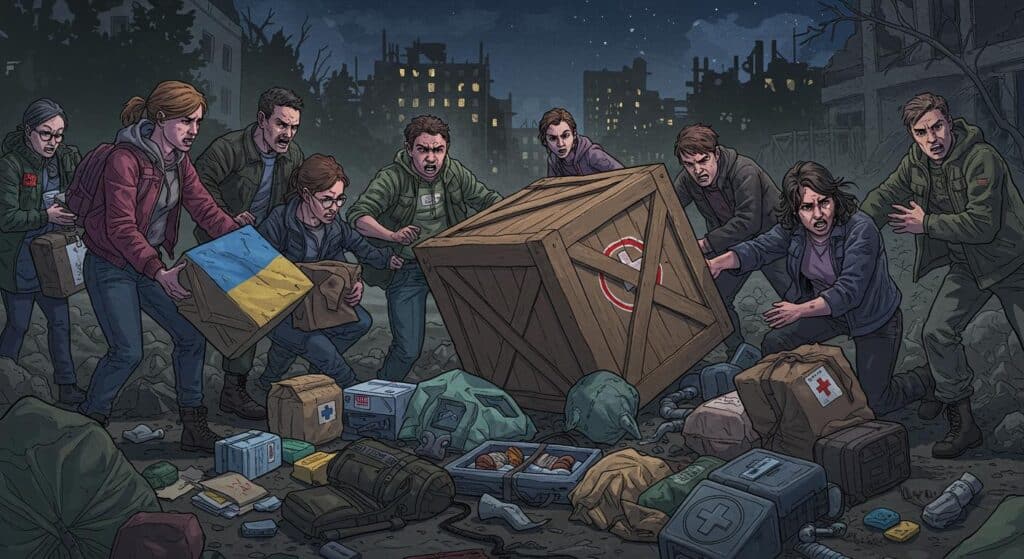You know the phrase “not all heroes wear capes”? Sometimes their chosen accessory is a trunkful of plastic bottles and, apparently, a sturdy disregard for border protocol.
Bottling Up Kindness—And a Bit of Confusion
According to The Express, the latest chapter in the long-running saga of unconventional humanitarianism unfolded on South Korea’s Ganghwa Island, where six Americans—ranging in age from their 20s to 50s—were detained by South Korean police in the early hours of Friday. Police officers, not authorized to speak on record, told the outlet that the group was intercepted as they attempted to send approximately 1,600 plastic bottles across the sea toward North Korea. These bottles weren’t just filled with hope: each was packed with rice, miniature Bibles, $1 bills, and, for an extra flourish, USB sticks. Whether the intended recipients were meant to snack, save, or stream something subversive is an open question, as the contents of the USB drives are still under review.
Details provided by Yes Punjab highlight that, aside from their passion for DIY exports, the Americans weren’t affiliated with any local civic or religious groups, at least according to Incheon-area police investigations. Authorities are now looking into whether these would-be bottle boaters have ties to organizations inside or outside South Korea. In the meantime, the individuals aren’t being held in detention, as police determined the situation didn’t justify an arrest warrant. However, they do face charges under the country’s disaster management and safety framework act, given the area’s designation as a restricted “danger zone” since November.
Meanwhile, Al Jazeera reports that South Korea’s Ganghwa Island, the attempted launch site, lies precariously close to a heavily guarded and historically tense segment of the North-South border. The US embassy, wisely choosing the “no comment” option when asked about the incident, appears in no rush to add diplomatic fuel to the already peculiar fire.
Old Bottles, New Bindings
Those familiar with the off-beat ebb and flow of inter-Korean relations might catch a whiff of déjà vu in all this. Bottle and balloon campaigns are a niche tradition in the region—one that sometimes smuggles media and messages across fortified lines. As noted by The Express, defectors and activists have in the past launched everything from rice to USB drives loaded with South Korean dramas and even a K-pop chorus or two. The intention varies: sometimes it’s humanitarian aid, sometimes an attempt to pierce the North’s iron information curtain, and sometimes an uneasy mixture of both.
Each time these projects float, so to speak, North Korea responds like clockwork—with condemnation, harsh words, or countermeasures. Al Jazeera points out that Pyongyang takes particular issue with anything perceived as external propaganda or religious outreach, such as the Bibles found in these bottles, which are unlikely to make it onto any approved North Korean reading list. In fact, regional tensions around border campaigns have prompted shifting legal responses; The Express relays that a ban on cross-border balloon and bottle launches was enacted in South Korea from 2021-2023, intended to quell irritation from the North and keep things cool on the peninsula. Yet, in 2023, the South Korean Constitutional Court found an absolute ban on leaflets and similar items to be an overreach on free speech—a pendulum swing that President Lee Jae Myung’s new administration now seeks to moderate with an emphasis on public safety and stability.
Yes Punjab ties these new policies directly to Lee’s peace-oriented agenda. Since taking office earlier this month, he’s ordered stricter enforcement against anti-Pyongyang materials in hopes of coaxing North Korea back to the negotiating table—halting loudspeaker propaganda broadcasts and, ideally, putting a lid on bottle-related extracurriculars. The goal seems clear: sidestep provocations and give dialogue a shot, even if recent North Korean rhetoric doesn’t suggest a warm welcome for olive branches, plastic or otherwise.
Peering Inside the Bottles
There’s an undeniable curiosity about the specific cargo destined for North Korean shores. The Express relays that the USB drives are still being examined by South Korean police, though in years past, such files have ranged from music videos to Wikipedia dumps—a “world outside” sampler intended to intrigue or enlighten the finder. As for rice and cash, Yes Punjab references longstanding efforts by defectors and outsiders to smuggle practical aid to North Korea’s impoverished communities, though the one-dollar bills arguably raise as many questions as they might answer for North Korean beachcombers. Then there’s the scripture—possibly life-changing for some, unnecessarily incendiary for others, and absolutely certain to annoy Pyongyang’s security forces.
Are these bottles meant as rescue, resistance, or just rogue performance art? Is there a clear line between provocative protest and sincere outreach, or do these missions exist precisely in the gray area between the two?
Where Law, Symbolism, and Subtle Defiance Intersect
Agency statements cited in Yes Punjab clarify that—though the group won’t be kept behind bars during the investigation—the area of Ganghwa Island has been off-limits for such efforts since November, falling under administrative orders intended to prevent exactly these kinds of unsanctioned launches. South Korean authorities are apparently accustomed to a certain frequency of quirky activism along the border: another recent attempt at a balloon launch, this time by a local activist, also ended in arrest earlier this month. The Express groups this uptick in enforcement under Lee’s broader strategy of easing tensions while tightening public safety restrictions.
As for the US embassy, Al Jazeera reports total silence—a predictable move, given the awkward optics of American citizens launching covert aid missions (complete with currency and religious texts) from another nation’s buffer zones. One wonders what the contents of the inevitable cables back to Washington will be: surely, there’s only so many ways to phrase “Americans attempted to send Bibles in bottles to North Korea—again.”
Messages in Bottles: Odd Hope or Just Flotsam?
Stepping back, there remains a certain whimsical optimism in these DIY cross-border missions. Why would six unaffiliated Americans (as Yes Punjab and The Express both document) take it upon themselves to undertake a logistical and legal headache just to send literal messages in bottles to the most secretive regime on earth? Do they envision their handiwork being fished from the surf by grateful hands, or simply existing as a curiosity—a physical metaphor for communication attempts so often stymied by borders and ideology?
History is peppered with oddball activism: from Cold War radio jammers to pamphlet balloon drops sifting through the Berlin air. Sometimes, these efforts leavened policy or shifted culture; other times, they drifted away, unseen and unanswered. This latest escapade, with its plastic bottle fleet and its discordant blend of aid and evangelism, fits right in—a reminder that, strange as it may sound, people sometimes try to save the world one improbable gesture at a time.
Will these bottles change any hearts or minds? Or will they simply wash ashore as another piece of global flotsam, more symbolic than practical? That, as so often is the case with the Korean peninsula, remains a question still floating at the edge of possibility.







